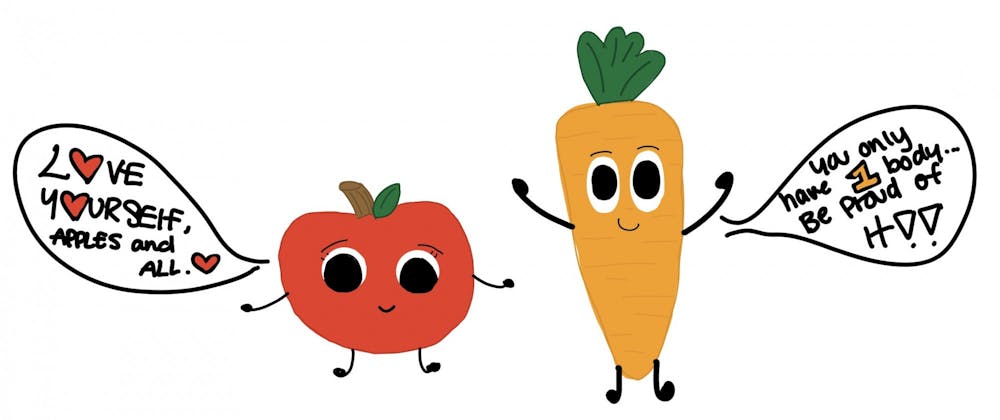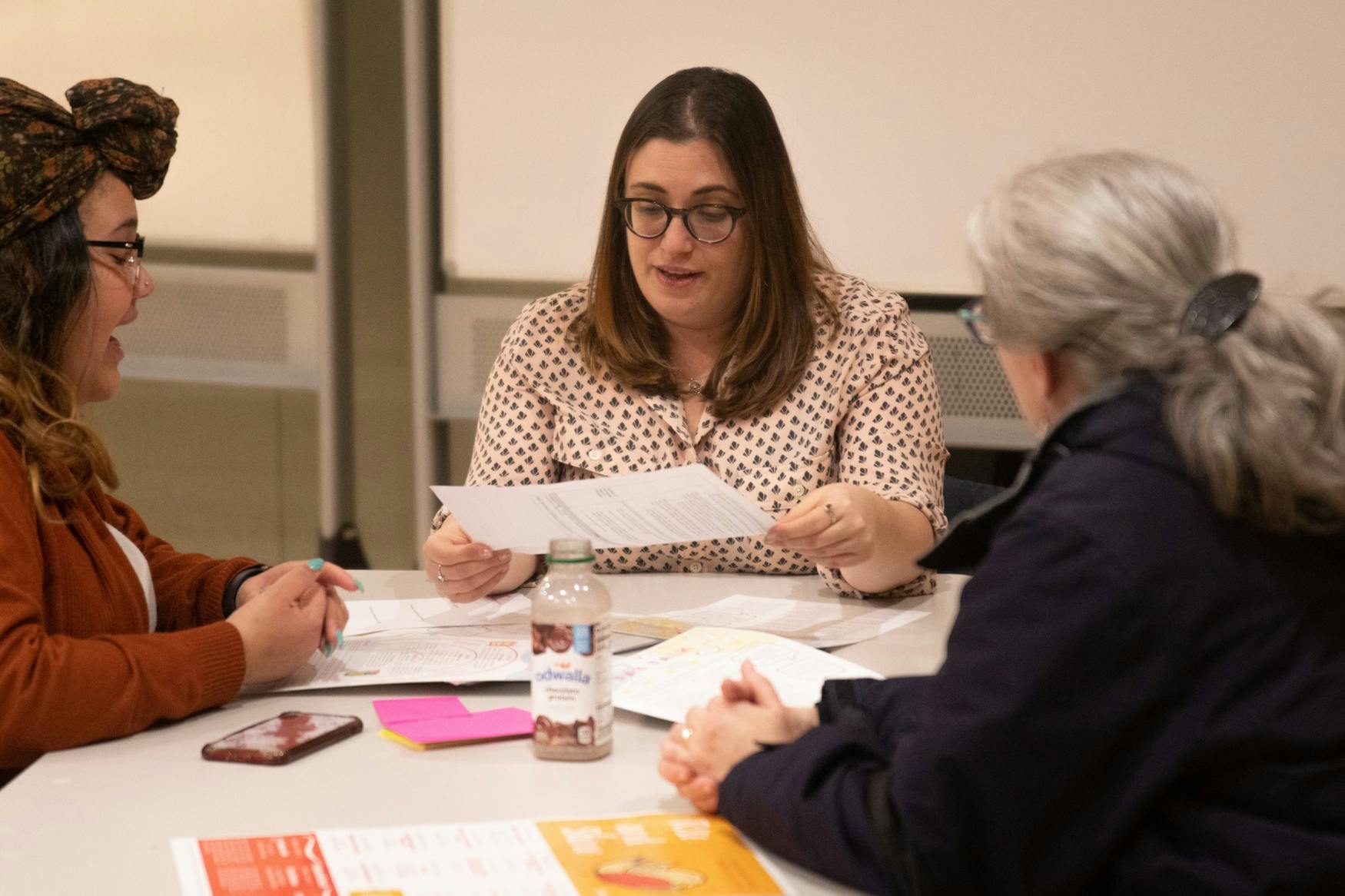Brandeis Body Positive is here!

The American Counseling Association defines body image as an “individual’s evaluations and affective experiences regarding their physical attributes.” Body image has become of particular interest over the course of the last few decades, with an increasing number of programs and workshops being implemented as part of high school and college curricula. The increased focus on promoting positive body image stems from societal standards and expectations around physical appearance — standards that deem thinness as more attractive and healthier than other body types. With the mass use of social media among teenagers, such standards have become more widespread, and young individuals are increasingly engaging in unhealthy eating habits and excessive exercise in an attempt to acquire certain looks. While issues with body image are more common among women — mostly because puberty, menopause and pregnancy are often accompanied by an increase in body fat — it is important to highlight that these issues can affect anyone at any point in time.
When it comes to college students, studies have concluded that 85% of women believe that they are either overweight or seriously overweight, even though most of those who report such feelings are at a weight considered healthy for their age and height. While initially shocking, these statistics are not surprising considering the changes in lifestyle, stress and expectations that characterize the transition from high school to college. For many, moving to college marks the first time someone is living away from a controlled and monitored environment. While at home parents typically provide healthy meals and monitor their child’s eating, college students are free to choose when, what and how much to eat. This can easily lead to overeating and indulging on desserts available at the dining hall or to skipping meals, both of which are potentially harmful. Additionally, stress from adjusting to a new environment can fuel certain eating habits that might trigger weight loss or gain. For first-year students these issues become real before they arrive on campus, with internet forums, peers and even family members discussing the famous “freshman 15.” A term that refers to the weight that individuals tend to gain their first year of college, the "freshman 15" has fueled body dissatisfaction among this cohort, even though multiple studies have found that the average weight gain for first-year students is only 2.7 pounds.
Knowing that body dissatisfaction can lead to low self esteem, higher rates of mental health problems and a propensity to eating disorders, there have been worldwide efforts to diminish diet culture and increase acceptance of different body types. On campus, the Brandeis Counseling Center and Health and Wellness Promotion partnered to create Brandeis Body Positive, a program that “trains staff, faculty, and students to facilitate a group curriculum addressing body image, intuitive self-care, and community building for various campus audiences,” per the Brandeis website. Their first workshop, “The Words We Say,” took place this past Thursday, and two other events are scheduled for later in the semester. The Justice spoke via email to Leah Berkenwald ’07 and Rachael Puccillo, the main organizers of this movement, to gain insight on the planning process, the community’s response and the future of the program.
Per Puccillo, an eating disorder specialist at the BCC, planning for the Body Positive Brandeis began in the spring of 2019. Attempting to bring an inclusive body positivity program to Brandeis and drawing on the experience of Berkenwald at Cornell University, the team agreed to use the Body Positive curriculum as a foundation. The Body Positive, Berkenwald explained, “is the first organization to create a body image curriculum that is modern, progressive, weight-neutral, and inclusive of all genders, sexualities and racial/ethnic identities.” Founded by Connie Sobxzak and Elizabeth Scott in 1996, The Body Positive implemented a new online learning platform in 2018 that offers training for individuals looking to become Be Body Positive Facilitators from the comfort of their communities. The Body Positive curriculum focuses on the five core competencies—reclaim health, practice intuitive self care, cultivate self love, declare your own authentic beauty and build community— as stated on their website.
While the initiative at Brandeis is fairly new, Puccillo noted in an email to the Justice that “several staff members have engaged in building and developing the program. Many of them have suggested that their views on body image have expanded and that they are more aware of the impacts of sizeism and diet culture than they were prior to doing this work.” Brandeis staff members are not the only ones partaking in the implementation of the program: both graduate and undergraduate students are welcome to apply to be student facilitators and help with the organization of events. Indeed, Puccillo shared her excitement over student involvement in the program, stating that while it might take some time and guidance, the current leaders would “love to see Brandeis Body Positive become a fully peer led and student sustained organization” in the future.
As for other long-term goals, Puccillo explained the team’s desire for the program to become fully integrated “into the larger social justice mission of the University.” This entails creating a safe space for discussion and fostering “compassion, curiosity and awareness” among students when “body image and sizeism issues occur,” she said. While conversations about these issues might be difficult, there are certainly ways to ensure the dialogue encourages open mindedness and respect. Puccillo recommends that individuals “read up on and educate themselves fully about the myths we adhere to around food behavior and body image.” Doing so has a self-reflective component that can help people identify their own biases in a way that allows them to critically evaluate their own experiences with body image. Because most people rely on the internet or the media to obtain information, it is important to note that such mediums can be both a source of detrimental comparison and false information and a platform to share information and access helpful resources.
Apart from educating ourselves and reflecting on our own experiences, it is important to become aware of unintentional discrimination against certain body types, according to Berkenwald, who highlighted the importance of recognizing “what it feels like to show up to class or a community event only to find that you literally do not fit.” Identifying such instances and changing our perception of discrimination and sizeism as a whole is a community wide effort. Only as a community, Berkenwald added, can we “make the changes that are necessary for ALL students to feel like they—and their bodies—are valued and welcomed on our campus.
Making changes to our relationships with our bodies at the individual level can also contribute to a more accepting campus. Whether it be by going on a walk with a friend, making a list of things you like about yourself, appreciating all that your body does everyday and/or surrounding yourself with positive people, we can all improve our perceptions of our body. It can also be helpful, per Berkenwald, to:
"1) Separate 'health' from 'appearance' or 'weight.' A lot of folks conflate these terms, but health is independent of body size and shape. Try to separate in your mind what you are doing to improve your health versus what you are doing to improve or change your appearance. If you want to change your appearance, that's okay, but own it. Do not conflate weight, muscularity or beauty with health. To learn more, check out the Health at Every Size movement, a weight-neutral approach to health.
"2) Start paying attention to 'fat talk,' or the pattern of self-denigrating talk about our bodies and eating and exercise habits. Research has proven that hearing this kind of talk—even for just 3 minutes— has a negative, causal, effect on your body image. Those who participate in fat talk conversations experience more negative impact than those who listen but do not participate. To protect yourself, avoid participating in these conversations. To protect everyone around you, intervene by changing the subject or asking others to stop.
"3) Expose yourself to images of different body shapes and sizes. Look at these images until you no longer feel uncomfortable. By learning to see the beauty in others' "imperfect" bodies, you can more easily see it on your own.
"4) Curate your media consumption to include influencers promoting body diversity and acceptance, and avoid those who are promoting a specific body type. Be aware that many 'wellness' influencers are really selling weight loss, not wellness. Look at their messages with a critical eye."
Brandeis Body Positive’s next event will take place on March 19. Whether you are someone who currently struggles with body image, know people who do or simply want to learn more about this issue, participating in Brandeis Body Positive workshops is a great way to obtain accurate information and partake in a welcoming and accepting environment.
If you need to talk to someone immediately, please call one of the following resources:
BCC after hours: 781-736-3785
Brandeis 6TALK: 781-736-8255
National Suicide Prevention Lifeline: 800-273-8255
National Eating Disorders Association Helpline: 800-931-2237
Self-harm Hotline: 800-273-TALK




Please note All comments are eligible for publication in The Justice.